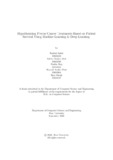| dc.contributor.advisor | Shakil, Arif | |
| dc.contributor.author | Sakib, Hasibul | |
| dc.contributor.author | Alok, Aditto Baidya | |
| dc.contributor.author | Huq, Fardin | |
| dc.contributor.author | Ullah, Shamsil Arafin | |
| dc.contributor.author | Ghosh, Riya | |
| dc.date.accessioned | 2024-05-05T04:13:32Z | |
| dc.date.available | 2024-05-05T04:13:32Z | |
| dc.date.copyright | 2023 | |
| dc.date.issued | 2023-09 | |
| dc.identifier.other | ID 19101283 | |
| dc.identifier.other | ID 19101509 | |
| dc.identifier.other | ID 22241141 | |
| dc.identifier.other | ID 19101164 | |
| dc.identifier.other | ID 19101327 | |
| dc.identifier.uri | http://hdl.handle.net/10361/22713 | |
| dc.description | This thesis is submitted in partial fulfillment of the requirements for the degree of Bachelor of Science in Computer Science, 2023. | en_US |
| dc.description | Cataloged from PDF version of thesis | |
| dc.description | Includes bibliographical references (page 81-84). | |
| dc.description.abstract | Cancer, an enduring medical enigma with historical recognition dating back to ancient
civilizations, remains without a definitive cure. This research undertakes a
comprehensive investigation encompassing nine prevalent global cancer types, including
those with significant implications for the population of Bangladesh. Employing
cutting-edge machine learning (ML) and deep learning (DL) models, as well
as traditional machine learning techniques, our study derives its strength from an
extensive dataset sourced from the Surveillance, Epidemiology, and End Results
(SEER) program. Our research endeavors to unravel the intricate tapestry of cancer
by distilling pivotal insights from substantial datasets. At its core, our mission
is to redefine the landscape of cancer treatment through the creation of predictive
models, thus heralding an era of personalized and highly efficacious cancer therapies.
Based on a hypothesis, our objective seeks to improve cancer treatment by
developing predictive models. Through a comparative analysis involving traditional
machine learning models, deep learning algorithms, and boosting models, we have
discovered that the boosting models stand out in terms of accuracy, indicating their
potential to enhance predictive precision for therapeutic response. We hypothesize
that the surgical removal of localized tumors can effectively arrest cancer progression,
thereby increasing patient survival. This encapsulates the main focus of our
study, which is a committed attempt to identify unique answers to a persistent
medical dilemma by integrating the knowledge of the past with the potential of the
future. | |
| dc.description.statementofresponsibility | Hasibul Sakib | |
| dc.description.statementofresponsibility | Aditto Baidya Alok | |
| dc.description.statementofresponsibility | Fardin Huq | |
| dc.description.statementofresponsibility | Shamsil Arafin Ullah | |
| dc.description.statementofresponsibility | Riya Ghosh | |
| dc.format.extent | 96 pages | |
| dc.language.iso | en | en_US |
| dc.publisher | Brac University | en_US |
| dc.rights | Brac University theses are protected by copyright. They may be viewed from this source for any purpose, but reproduction or distribution in any format is prohibited without written permission. | |
| dc.subject | SEER Data | en_US |
| dc.subject | Machine learning | en_US |
| dc.subject | Deep Learning | en_US |
| dc.subject | Cancer | en_US |
| dc.subject | Survivability | en_US |
| dc.subject.lcsh | Machine learning. | |
| dc.subject.lcsh | Data mining. | |
| dc.subject.lcsh | Cancer--Chemotherapy. | |
| dc.subject.lcsh | Cancer--Radiotherapy. | |
| dc.title | Hypothesizing precise cancer treatments based on patient survival using machine learning & deep learning | en_US |
| dc.type | Thesis | en_US |
| dc.contributor.department | Department of Computer Science and Engineering, Brac University | |
| dc.description.degree | B.Sc. in Computer Science | |

